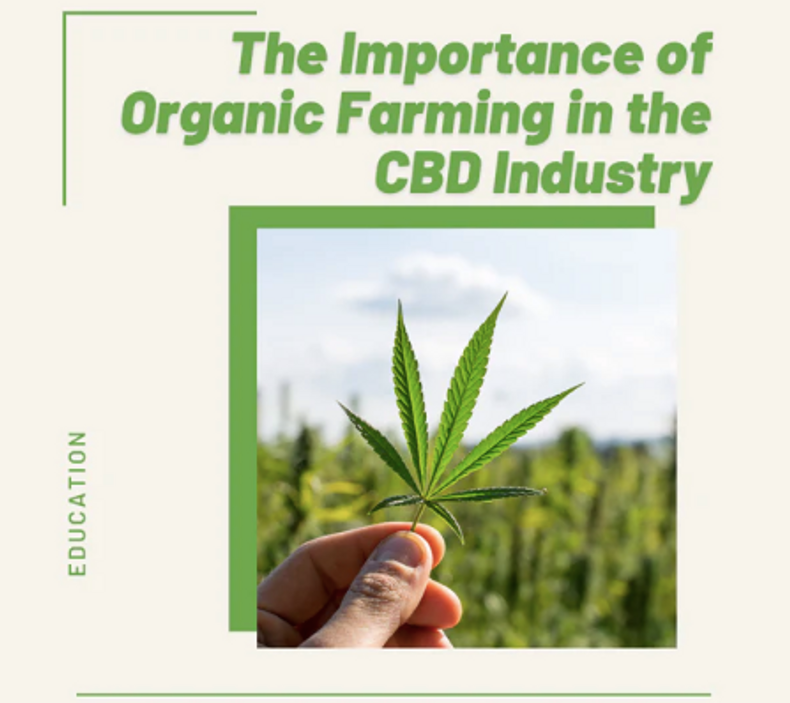
The Importance of Organic Farming in the CBD Industry
For years the term “organic” has been in the spotlight but do we really understand it? It can’t be just a fad since it’s still a thing, right? We have put our hearts and souls into our CBD family of brands. Our research always leads us to the same realization: organic matters. We’re here to help you understand why choosing organic may not always be feasible, but truly is better. And when it comes to CBD, why we feel like organic is the only way to go. Let’s dive into some important regulations associated with hemp so you can better understand how to navigate the grey area the entire industry is still working within.
Hemp Regulations
Regulations in the hemp industry have long been behind those of medical and recreational cannabis. The Agricultural Improvement Act of 2018 (commonly known as the Farm Bill) was revolutionary; finally making hemp legal in all 50 states in December of 2018. In December of 2019, the Environmental Protection Agency (EPA) added 10 new pesticides to the list of approved pesticides for hemp production[1]. This goes for all hemp! Just because a pesticide is deemed safe for hemp being turned intofiberdoesn’t mean it is safe for use on hemp being processed forconsumptionorinhalation. Regulations in the industry are a good thing, especially when we are talking about ingesting anything. We want regulations to further combat the use of any harmful pesticides or other foreign substances in our products.
An article published in the Medical Cannabis and Cannabinoids journal entitled “The Trouble with CBD Oil” stated, “If any of these contaminants [pesticides, heavy metals, solvents, etc.] were present in hemp used for CBD extraction, they would likely end up in concentrated form in the resultant oil.” A pesticide analysis lab indicated, “The rule-of-thumb for pesticides in concentrates is this: expect about a tenfold increase in pesticide burden versus the flower used for extraction.”[2]
What does this mean? The concentration of pesticides in the end product will multiply by 10 when it’s extracted and concentrated into an oil. Hemp is also a very porous plant that will absorb everything that is in the soil or sprayed onto it.
These are a few major reasons we feel it is paramount to find brands that employ organic farming practices to avoid the use of pesticides in the first place.
The Dangers of Diluted Products
Unfortunately there is no standardized ‘unit’ of CBD. Therefore, formulators have found ways around regulations by mixing contaminated oil with clean oil to mask those contaminants from testing equipment. If you refer back to:Pure CBD or Snake Oil, we break down why CBD is so often diluted.
Dilution can significantly affect the potency and efficacy of a product itself. This may be another reason why one brand of CBD may aid in the relief of your symptoms, when another comparable brand may not; CBD vs. snake oil.
Do Your Homework
Nowadays, we can purchase CBD almost anywhere; CBD-dedicated storefronts, tobacco/smoke shops, grocery stores, and even gas stations. With so many businesses just trying to make that quick sale on this green rush, it is important to know what to look for. No matter where you choose to purchase your CBD products from, be sure that the business selling it can offer some key information to you as the consumer:
- Can they provide you with a Certificate of Analysis (COA)? A COA can ease our minds that a product was tested in a qualified lab and is free of pesticides, heavy metals and other potentially toxic contaminants. Then be sure to read and interpret the COA – give us a call we are happy to help!
- Can the seller tell you where the hemp was sourced, how it was grown and extracted? If organic practices are not mentioned, we recommend seeking CBD elsewhere.
- How was the hemp extracted? CO2 Extraction is the cleanest extraction process when it comes to CBD. There are other methods that may be less expensive, but definitely do not leave the product as pure.
These quick questions can you get you on the right path to not only choosing who you purchase CBD from, but also to choose a CBD product that meets and hopefully exceeds your expectations of being safe to ingest. If the person you are inquiring to cannot answer these basic questions, we recommend kindly thanking them and going to an expert source.
Happy Trails to the Rescue
At Happy Trails, we understand CBD in depth because CBD is what we work with on a daily basis. We desire to educate; so that as a consumer, you can invest in a product that will work and one you’ll feel really good about purchasing. At the end of your journey, we hope to celebrate healing with you!
Have additional questions? Please don’t hesitate to reach out to us onfacebook,instagramor direct message ushere.
Sources
[1] Environmental Protection Agency (EPA), Pesticide Products Registered for Use on Hemp, Dated: August 13, 2019. FR Doc. 2019-18151 Filed 8-23-19, EPA-HQ-OPP-2019-0369.https://www.regulations.gov/document?D=EPA-HQ-OPP-2019-0369-0001
[2] Hazekamp A., “The Trouble with CBD Oil”,Medical Cannabis and Cannabinoids, June 2018, Vol.1, No. 1 .https://www.karger.com/Article/FullText/489287

